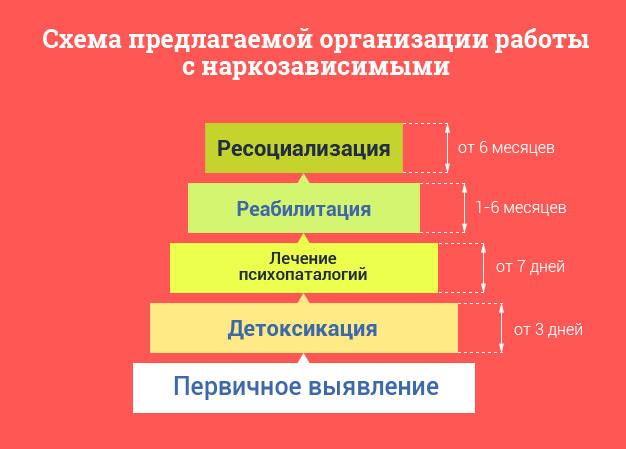Table of contents article:
- Types of addiction treatment programs
- Medical Detox
- Drug treatment
- Hospital treatment
- Rehabilitation at home
- Partial hospitalization program
- Intensive outpatient treatment
- Outpatient treatment
- Dual diagnostics
- Forensic treatment
- Faith-Based Rehabilitation
- Follow-up care
- Short and long term addiction treatment
- Addiction treatment process
- Frequently asked questions about treatment
“Drug addiction treatment is highly individualized – not all therapies or medications are suitable for every person. You have to find something, the lower the risk of developing problems. It's called harm reduction. Your goal is to improve your health and your life. Specialists help each patient understand, what options will help him achieve the greatest success ".
Drug addiction treatment programs vary depending on the person's needs and the extent of their addiction.. Some people can be treated on an outpatient basis, while others may require more intensive therapy, for example, treatment in a proven hospital drug treatment clinic. A team of experienced specialists drug addiction can work with a person, to determine, which drug addiction treatment program is best for him.
Types of addiction treatment programs

There are several types of addiction treatment programs. Some people may go through different phases of treatment., whereas others may only need one or two treatment level.
Medical Detox
Medical detoxification program – this is the first step for those, who begins treatment for severe addiction to such substances, like heroin, alcohol or benzodiazepines. During medical detoxification, patients are supervised by trained medical professionals, that can track symptoms and keep patients safe while quitting drugs, smoking cigarettes or alcohol.
In a therapeutic detoxification program, staff may provide medications to ease the discomfort of withdrawal, when drugs and alcohol leave the body. For example, experts report, what people, heroin addicts, may take lofexidine to relieve withdrawal symptoms. People may also take buprenorphine or methadone during medical detoxification. It is important to remember, that medications are used during withdrawal only after, how they got clinically tested by a healthcare professional.
Drug treatment
Medicines can be used during the medical detox withdrawal process, and they may also be part of an ongoing drug treatment program. Medication-assisted treatment involves the use of medications in tandem with counseling during the recovery process.
Medication is commonly used to treat illicit opioid addiction, prescription, and alcohol. Medications can help control cravings and stabilize brain chemistry and body functioning. According to research, drug treatment can help people continue their treatment, reduce the abuse of opiates, increase survival rate and reduce criminal activity. Just like a medical detox, methadone treatment and buprenorphine are commonly prescribed for medication-assisted treatment of opioid addiction. Disulfiram and acamprosate may be used to treat alcohol abuse.
Hospital treatment
Inpatient rehabilitation usually takes place in a hospital or clinic, specializing in inpatient treatment. In this type of treatment, healthcare workers monitor patients and have 24-hour access to nurses. People, undergoing inpatient treatment, often receive medications and counseling services, and also participate in group therapy.
Inpatient treatment usually includes ongoing addiction assessment and goal monitoring. After, how the patient completed the inpatient treatment, the staff draws up a discharge plan, and the patient is transferred to another medical institution, for example, for ongoing outpatient therapy.
Rehabilitation at home
Rehabilitation at home and in an environment similar to inpatient treatment, but usually lasts longer. Community-based services are usually provided outside of hospitals, that is, a more homely atmosphere is created in residential premises. People, inpatient, permanently reside in a medical institution.
Rehabilitation stays can last anywhere from a few weeks to a few months to help people develop healthy social skills and change dysfunctional behaviors.. However, the duration of treatment is complex and can vary widely depending on the program and individual needs.
Partial hospitalization program
Partial Hospitalization Program Offers an Alternative to Home or Hospital Treatment. These programs are offered either in hospitals, or in free-standing clinics and provide intensive services. People, who participate in the partial hospitalization program, can receive treatment during the day, in the evening or on weekends and return home at night. If a supportive home environment is not available, clients can live in the wards of the clinic.
Partial hospitalization is suitable for patients, who do not pose a danger to themselves, but still require intensive treatment. In these programs, people spend more time in treatment, than in traditional outpatient programs, but they can live at home and receive treatment and consultations remotely.
Intensive outpatient treatment
Intensive outpatient treatment includes group sessions, as well as individual consultations. People, who are undergoing intensive outpatient treatment, can also take medications and receive medical services. Depending on the program, clients may live away from home. Online consultations are also common at this level of treatment.
Intensive outpatient programs are an alternative to hospitalization or inpatient programs. In some cases, people begin an intensive outpatient program after transitioning from hospital. According to research, intensive outpatient programs with at least nine hours of service per week, but some programs may be more intense.
Outpatient treatment
Outpatient rehabilitation – This is a step away from intensive outpatient treatment. Patients, outpatient, receive less than nine hours of care per week.
Similar to intensive outpatient programs, outpatient rehabilitation usually includes individual and group counseling, and access to medicines and health services. In outpatient programs, people make appointments at that time, which matches their schedule, and they can continue to work in the community and live at home throughout treatment. Outpatient programs offer flexibility, what is the advantage of this type of treatment.
Dual diagnostics
Dual diagnosis treatment is provided to individuals, addicted, and mental illness. For example, people, who lives with opioid dependence and bipolar disorder, may be a candidate for treatment with a dual diagnosis.
With this form of treatment, people receive comprehensive services, aimed at both drug addict, and for mental disorders. People in dual diagnosis services receive counseling, ancillary services and medications. Treatment plans must take into account both mental health conditions, and addiction, to be effective. For example, if a person is undergoing addiction treatment, but does not cure underlying depression, he may return to drug use as a form of self-medication.
Forensic treatment
The court-ordered treatment is provided as a legal consequence for the offenses, drug-related, and entails consequences in case of non-compliance. Studies show, that court-ordered treatment is just as effective, if not more, than voluntary addiction treatment. Can take many forms and is often performed under the same conditions, same as voluntary treatment. Specific treatment requirements vary depending on the court's verdict.. In some cases, treatment may be provided as an alternative to incarceration or as a way to reduce the length of a prison sentence or probation..
Depending on the level of the offense, court-ordered treatments include educational programs, group consultations, outpatient programs, community and residential programs.
Faith-Based Rehabilitation
Some treatment facilities approach addiction recovery through a spiritual lens. The most famous community support group, Alcoholics Anonymous (AA), was founded on solid religious principles and continues to promote faith-based healing among its 2 million members worldwide.
If you believe, that spiritual principles can benefit your recovery, you can easily find treatment programs, in which these principles are implemented along with traditional medicine. Studies show, that recovering patients with a higher level of spirituality exhibit such positive qualities, as heightened optimism, less anxiety and higher resistance to stress. Helping a recovered person find inner strength, religious rehab centers hope to strengthen it path to sobriety.
Follow-up care
Aftercare includes services, in which people participate, to maintain sobriety long after completing a treatment program. Postoperative care services may include ongoing counseling, participation in support groups or connection with case management or peer support services. Aftercare plays an important role in preventing relapse. According to research, aftercare is more effective, when people engage in it for longer periods of time.
Short and long term addiction treatment

- Short-term treatment usually lasts about 30 days, but treatment of such duration may not always be effective. Short-term residential programs are usually intensive, and people need to transition to an outpatient program after completing it.
- Long-term treatment usually lasts from three to 12 months. Long-term inpatient treatment takes place at home, and people have access to medical care 24 hours a day. A common long-term treatment model is the therapeutic community, and people, participating in this type of program, usually remain in treatment for six to 12 months. Long-term treatment usually begins with drug detox, and then the person goes to the program, which is initially strict and follows a structured schedule with strict rules. To the extent that, how people progress in treatment, they get more flexibility.
Addiction treatment process
Addiction treatment – it's a process, which usually happens in stages. For example, the addiction treatment process usually begins with intake and continues from there.
Below are typical steps in an addiction treatment program.:
- Admission: the intake process involves the collection of information by a drug addiction specialist, to accept you into a treatment program. For example, the specialist will discuss your medical history and, probably, conduct a basic medical examination. basic information, such as date of birth, income, family background and employment history, will also be collected during the admission process.
- Screening and assessment: During the screening and treatment assessment phase, the professional will use such a tool, as a screening test for drug abuse, to determine the extent of a person's problem. These tools include a brief interview and effectively provide the treatment team with information about substance use.. Using screening and assessment results, professional team can determine, what further assessments are needed.
- Assessment: Once the screening and assessment is complete, a full substance abuse assessment. This assessment will be more complete. During this evaluation, the doctor will gather information about your substance abuse history., including about, when did you first start using, what substances did you use, and how often and in what quantities did you use. The doctor will also discuss the symptoms of your substance abuse, for example, are experiencing whether you have withdrawal symptoms, what physical consequences have you experienced as a result of substance abuse and whether you have experienced legal difficulties or problems at work or at home due to drugs. The clinician may use an assessment tool, such as “Addiction Severity Index” (BUT). to gather comprehensive information about your substance use and its consequences.
- Development of a treatment plan: Once a full assessment is completed, the clinician will work with you to develop a treatment plan. Drug treatment plans take these needs into account, like quitting drugs and getting a job, and, what services or resources will be used to solve these problems. The treatment plan also outlines long-term goals and short-term goals. Experts report, that treatment plans must also take into account the client's strengths.

12 steps to get rid of addiction.
Frequently asked questions about treatment
Starting treatment can be scary, especially if you have never been through a treatment program before. Frequently Asked Questions about Rehabilitation may ease some of your concerns and provide you with information, necessary for confidence in admission to treatment. Here are some of the most frequently asked questions about rehabilitation:
- How much does rehabilitation cost?? The cost of rehabilitation varies depending on, how long who – what they spend on treatment and what treatment programs they complete. For example, inpatient treatment program, in which a person spends 24 hours a day, receiving medical care, will cost more, than an outpatient program, involves visiting a drug and alcohol counselor twice a week for an hour.
- Does insurance cover rehabilitation?? Most rehab centers and outpatient programs accept insurance coverage for treatment, so some costs will be covered. Out-of-pocket costs will depend on your insurance coverage, duration of treatment and, what treatment will you complete. Different insurance plans vary in how much they cover addiction treatment costs..
- How long does rehabilitation take?? The length of the rehabilitation period varies for each person, as some people may progress through treatment more quickly, than others. In addition, inpatient or inpatient treatment programs are usually shorter in duration, and ongoing outpatient treatment usually lasts longer. Treatment should be of sufficient duration, to be effective. Moreover, as for stationary, and for outpatient treatment programs lasting less 90 days, as a rule, not so effective, like longer programs. Finally, the, who is involved in medication-assisted treatment for opioid abuse, it is usually necessary to undergo treatment for at least a year.










